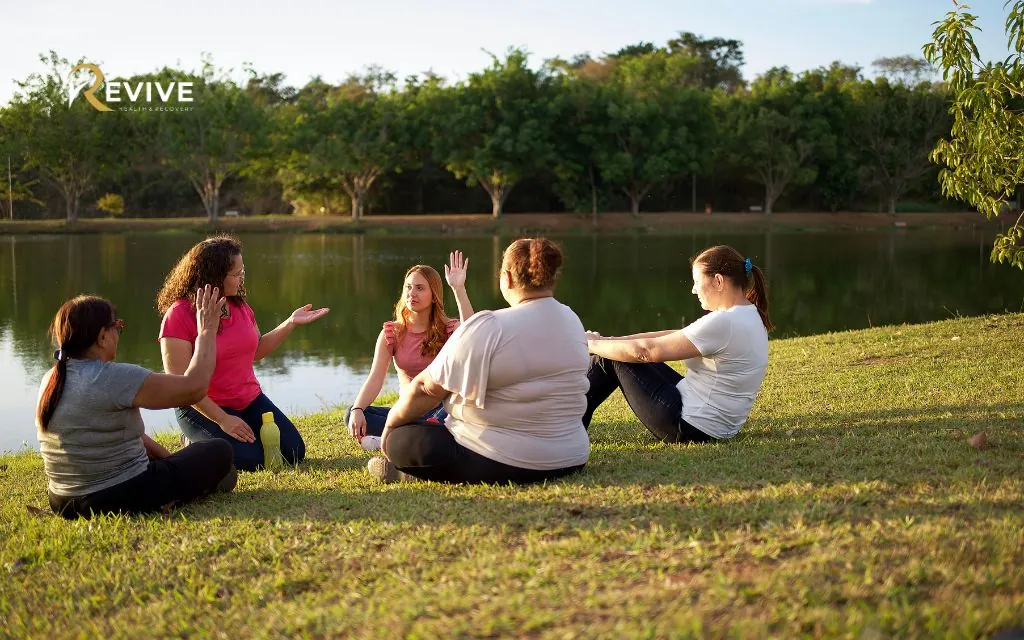Depression affects countless Colorado residents, with our state ranking 46th in mental health nationwide – a dramatic drop from 30th place in 2023. Nearly 30% of adults here experience symptoms of anxiety or depression, while 266,000 adults struggle with serious suicidal thoughts. Yet despite these challenges, stigma remains the largest barrier to seeking help, with nearly half of Coloradans avoiding care due to fear of judgment.
For many in Denver, traditional therapy and medication alone haven’t provided sufficient relief. A depression retreat offers a transformative approach that combines immersive therapeutic experiences with Colorado’s natural healing environment, providing hope for those seeking alternatives to conventional treatment.
What is a Depression Retreat? A Colorado Perspective
Definition and Purpose of Depression Retreats
A depression retreat provides a structured setting where individuals focus exclusively on healing through evidence-based therapies, self-care practices, and holistic approaches. Unlike standard weekly sessions, these programs offer immersive experiences that allow deeper processing and transformation.
Depression retreats address the mind, body, and spirit simultaneously, recognizing that mental health recovery requires more than just talking through problems. Participants step away from daily stressors to engage fully in their healing journey.
How Depression Retreats Differ from Traditional Therapy
While traditional therapy involves weekly sessions in clinical settings, depression retreats provide intensive, focused healing time away from daily pressures. These programs combine multiple therapeutic approaches in one comprehensive experience, creating community support and connection with others on similar journeys.
The intensive format allows participants to practice new skills immediately while receiving guidance and support. This accelerated approach often produces faster results than traditional once-weekly therapy sessions.
Types of Depression Retreats Available in Colorado
Colorado offers various retreat options including holistic programs focusing on whole-person healing, nature-based retreats utilizing our outdoor environment, professional mental health retreats with clinical support, and outpatient retreat programs allowing continuation of daily life.
Weekend mental health retreats provide intensive experiences for those unable to commit to longer programs, while multi-week options offer deeper transformation opportunities.

The Science Behind Nature-Based Depression Treatment in Colorado
How Colorado’s Natural Environment Supports Mental Health
Colorado’s unique landscape offers natural therapeutic benefits through mountain environments proven to reduce stress hormones. Exposure to natural light improves vitamin D levels and mood regulation, while higher altitude potentially affects neurotransmitter function beneficially.
Mountain healing in Denver provides enhanced endorphin release from physical activity, improved neuroplasticity supporting new mental patterns, and better sleep quality contributing to mood stabilization.
Research on Outdoor and Wilderness Therapy for Depression
Recent studies show outdoor therapy reduces depressive symptoms by up to 30% when combined with traditional treatments. Nature therapy depression approaches improve mood through increased physical activity and natural light exposure while enhancing mindfulness and present-moment awareness.
The combination of exercise and altitude creates optimal conditions for mental health recovery, making Colorado an ideal location for depression treatment.
The Role of Physical Activity in Mountain Settings
Physical activity in Colorado’s mountain settings provides unique benefits including enhanced endorphin release, improved neuroplasticity, and better sleep quality. The natural environment encourages movement while reducing the barriers often present in traditional gym settings.
Participants find themselves naturally more active when surrounded by Colorado’s inspiring landscapes, leading to improved mood and overall wellbeing.
Key Components of Effective Depression Retreats in Denver
Evidence-Based Therapeutic Approaches
Successful depression retreats integrate scientifically-validated treatments including Cognitive Behavioral Therapy addressing negative thought patterns, Dialectical Behavior Therapy for emotional regulation, and Mindfulness-Based Cognitive Therapy preventing depression relapse.
These evidence-based depression treatment approaches form the clinical foundation while being delivered in supportive, retreat-like environments that enhance their effectiveness.
Holistic and Complementary Practices
Beyond traditional therapy, effective retreats incorporate mindfulness practices and breathwork, yoga and somatic practices connecting mind and body, nutritional support optimizing brain health, and art and music therapy facilitating emotional expression.
These complementary approaches address the whole person, recognizing that depression affects multiple aspects of life and requires comprehensive treatment strategies.
Community and Support Systems
The social aspects of retreats provide connection with others facing similar challenges, reduction in isolation common with depression, practice with interpersonal skills in supportive environments, and creation of ongoing support networks.
This community element often proves crucial for long-term recovery, as participants develop relationships that continue beyond the retreat experience.

Outpatient Depression Treatment Options in Denver
Benefits of Non-Residential Depression Programs
For Denver residents, outpatient depression treatment programs offer integration of intensive therapy while maintaining daily responsibilities. These programs cost less than residential options while allowing immediate application of new skills to real-life situations.
Outpatient therapy programs provide greater accessibility for those with work or family commitments, making depression retreat benefits available to more people in our community.
Structured Intensive Outpatient Programs (IOPs)
Intensive outpatient programs provide retreat-like benefits through multiple weekly sessions totaling 10-15 hours, combination of individual and group therapy, skill-building workshops and experiential learning, and progressive step-down approaches as recovery advances.
These programs bridge the gap between traditional weekly therapy and residential treatment, offering the intensity needed for meaningful change while allowing participants to maintain their daily lives.
How to Integrate Retreat Elements into Daily Life
Practical strategies include creating micro-retreats through daily nature exposure, implementing mindfulness practices throughout the day, establishing consistent self-care routines, and building supportive communities outside of treatment.
The goal is helping participants maintain the benefits of their retreat experience long after the program ends, creating sustainable paths to ongoing mental wellness.
Choosing the Right Depression Retreat in Colorado
Questions to Ask When Researching Retreats
Important considerations include what qualifications treatment providers hold, what specific therapeutic approaches are offered, how progress is measured and supported after the program, and what balance exists between clinical and holistic approaches.
Understanding these factors helps ensure you choose a program that meets your specific needs and provides the best chance for successful outcomes.
Evaluating Cost and Insurance Considerations
Financial planning for depression retreats involves understanding what insurance may cover for outpatient programs, exploring sliding scale options and payment plans, considering HSA/FSA eligibility for mental health services, and weighing cost against potential benefits and outcomes.
When wondering “how much does a depression retreat cost in Colorado,” it’s important to contact providers directly for specific information, as costs vary based on program length and services included.
Red Flags to Watch For When Selecting a Retreat
Caution signs include promises of quick or complete “cures” for depression, lack of licensed mental health professionals, exclusive focus on alternative approaches without evidence-based treatments, and no clear aftercare planning or follow-up support.
Quality depression treatment centers maintain realistic expectations while providing comprehensive, professional care with proper licensing and credentials.

The Revive Health Recovery Approach to Depression Treatment
Trauma-Informed Care for Depression
Revive’s specialized approach recognizes the frequent connection between trauma and depression, the need for creating safety before deeper therapeutic work, the importance of regulating the nervous system through targeted interventions, and personalized approaches based on individual trauma history.
Our dual diagnosis treatment addresses both depression and underlying trauma, providing comprehensive care that addresses root causes rather than just symptoms.
Customized Outpatient Programs for Denver Residents
Revive Health Recovery offers tailored treatment through comprehensive assessment and individualized treatment planning, flexible scheduling to accommodate work and family commitments, combination of individual, group, and family therapy, and integration of evidence-based and holistic approaches.
We understand that each person’s depression experience is unique, requiring personalized treatment plans that address individual circumstances and goals.
Integration of Nature Therapy with Clinical Care
Revive’s unique approach combines guided therapeutic experiences in Denver’s natural settings, clinical processing of nature-based experiences, skills for continuing nature connection independently, and scientific frameworks for understanding nature’s mental health benefits.
This integration maximizes the healing potential of both clinical treatment and Colorado’s natural environment, creating powerful opportunities for transformation.
Success Stories: Depression Retreat Outcomes in Colorado
Case Studies from Denver Residents
Real experiences show transformation through combined clinical and nature-based approaches, long-term maintenance of gains after program completion, integration of retreat learnings into everyday life, and overcoming treatment-resistant depression through comprehensive care.
These success stories demonstrate the effectiveness of depression retreat approaches for Colorado residents seeking alternatives to traditional treatment methods.
Measuring Improvement: Beyond Symptom Reduction
Holistic outcome measures include enhanced quality of life and functionality, improved relationships and social connection, development of sustainable wellness practices, and greater resilience when facing life challenges.
True recovery involves more than symptom reduction – it includes rebuilding a meaningful life and developing tools for ongoing mental wellness.
Long-Term Benefits of Depression Retreat Experiences
Research indicates lasting effects including new neural pathways supporting positive thinking patterns, practical tools for managing future depressive episodes, enhanced self-awareness and emotional intelligence, and lifelong connection to nature as a healing resource.
These long-term benefits justify the investment in depression retreat experiences and demonstrate their value for sustained mental health recovery.

Preparing for a Depression Retreat Experience
Mental and Emotional Preparation
Setting yourself up for success involves clarifying personal goals for the experience, opening to new approaches and perspectives, developing readiness for emotional exploration, and creating intentions for applying new learnings.
Preparation enhances the effectiveness of depression retreat experiences and helps participants maximize their investment in healing.
Practical Considerations and Planning
Logistical preparation includes arranging work and family responsibilities, gathering necessary supplies and appropriate clothing, planning for integration of new practices afterward, and setting up support systems for the transition period.
Proper planning reduces stress and allows full focus on the therapeutic work during the retreat experience.
Making the Most of Your Depression Retreat
Maximizing benefits requires full engagement in all program components, practicing openness and vulnerability, connecting authentically with others in the program, and developing concrete plans for continuing practices after completion.
Active participation significantly improves outcomes and helps ensure the retreat experience leads to lasting positive changes.
5 Reasons to Choose Revive Health Recovery for Depression Treatment
Specialized Expertise in Mental Health Treatment
Revive offers licensed mental health professionals with extensive depression treatment experience, evidence-based protocols adapted for Colorado residents, trauma-informed approaches addressing root causes of depression, and continuous staff training in the latest treatment advances.
Our expertise ensures you receive the highest quality care based on current best practices in depression treatment.
Comprehensive Care Without Inpatient Requirements
Benefits include full range of therapeutic services without residential commitment, ability to practice new skills immediately in real-world settings, maintenance of important work and family connections, and cost-effective alternatives to inpatient programs.
This approach provides intensive treatment while allowing you to maintain your daily life and responsibilities.
Centrally Located in Denver with Access to Natural Settings
Convenience includes easy accessibility from throughout the Denver metro area, proximity to natural areas for outdoor therapeutic experiences, integration of urban and natural environments in treatment, and connection to community resources supporting recovery.
Our location maximizes both convenience and therapeutic opportunities for Denver-area residents.
Individualized Treatment Plans Based on Personal Needs
Tailored approaches include thorough assessment identifying specific needs and goals, customized combination of therapeutic approaches, flexible scheduling options fitting individual life circumstances, and adaptive programming responding to progress and challenges.
Every person’s depression experience is unique, requiring personalized treatment approaches for optimal outcomes.
Ongoing Support Beyond the Initial Program
Continuing care includes graduated step-down options maintaining connection, alumni groups and community events, resource referrals for complementary services, and regular check-ins supporting sustained recovery.
Long-term support significantly improves the likelihood of maintaining gains achieved during intensive treatment phases.

FAQs About Depression Retreats
How long do depression retreat programs typically last?
Depression retreat programs range from intensive weekend experiences to multi-week programs. At Revive Health Recovery, outpatient programs typically run 8-12 weeks with multiple weekly sessions, allowing depth of treatment while maintaining daily responsibilities.
Does insurance cover depression retreat programs in Colorado?
Many insurance plans cover components of outpatient depression treatment programs, particularly Intensive Outpatient Programs. Revive Health Recovery works with numerous insurance providers and can help determine your specific coverage options. Contact us at (303) 268-4655 for personalized insurance verification.
How do I know if a depression retreat is right for me versus traditional therapy?
Depression retreats may be appropriate if you’ve tried traditional weekly therapy without significant improvement, need more support than once-weekly sessions provide, or want an immersive experience focused on multiple aspects of wellbeing simultaneously. Revive Health Recovery offers consultations to help determine the best approach for your situation.
What types of depression respond best to retreat-style treatment?
Individuals with moderate to severe depression, treatment-resistant depression, or depression complicated by trauma often benefit significantly from intensive, multi-modal approaches. Revive Health Recovery specializes in these complex cases and can assess whether our programs are appropriate for your needs.
What happens after a depression retreat program ends?
Quality programs include comprehensive aftercare planning, ensuring continuity of care through step-down services, connection to community resources, maintenance therapy sessions, and tools for independent wellness practices. Revive Health Recovery provides extensive aftercare support to maintain your progress.
Taking the Next Step Toward Healing
Depression retreats offer powerful alternatives for Colorado residents seeking relief from persistent depression. By combining clinical expertise with the natural healing environment of the Rocky Mountain region, these programs address mental health challenges from multiple angles simultaneously.
Revive Health Recovery provides Denver residents with retreat-style treatment benefits in an accessible outpatient format, eliminating the need for residential stays while maintaining therapeutic intensity and effectiveness. Our comprehensive approach addresses the whole person, not just symptoms, creating lasting transformation and hope for the future.
Contact Revive Health Recovery Today
If you’re struggling with depression and seeking a comprehensive approach to healing, Revive Health Recovery is here to help. Our team of experienced mental health professionals offers personalized depression treatment programs integrating evidence-based therapies with holistic approaches.
Address: 1427 S Federal Blvd, Denver, CO 80219
Email: contact@revivehealthrecovery.com
Call Us – Available 24/7: (303) 268-4655
Take the first step toward reclaiming your life from depression by calling us today for a confidential consultation. Your journey to mental wellness begins with a single phone call.



